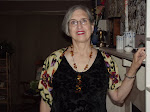In April 1968, I was a 17-year old white girl in
During my first and only visit to Caroline's house on base, I had my come-to-Jesus moment of understanding that race made no difference. Up 'til then, she had been my exotic friend, part of the "other," a "them" in the age-old game of "us against them." But when my parents dropped me off at her home, something miraculous happened to me. Caroline's family had a dog, a big, friendly, German Shepherd. That dog acted just like all the dogs my family had ever had - it loved Caroline and Caroline's family. In a flash of insight, I realized that the dog did not know this family was black, it just knew that they loved him. And I understood that they were not, in fact, different in any meaningful way from me and my family. Our dogs loved us, too.
Perhaps this sounds silly to a more sophisticated audience, but I lacked sophistication then and for many years after. It is hard to be sophisticated when your world is so small, when life is so predictable, when everyone around looks essentially just like you. I had an intellectual knowledge of the Civil Rights movement and I had opinions about Civil Rights (more on these topics later), but until Caroline, all that knowledge in my head, not in my heart. My friendship with Caroline, and especially that moment of insight with her dog, moved Civil Rights from my head to my heart and soul.
My parents supported the Civil Rights movement. Among their peer group, they were liberals, standing up against discrimination and the plight of black people in the South. (For us, in
My father said, after watching for some time, "If I was any kind of a man, I would be there marching with them, but I'm too afraid. I have seven children who depend on me and I am too cowardly to take the risk." A year or two earlier, my dad had been offered a fantastic career opportunity that would allow him to get his Ph. D. in microbiology with full time pay and then go to work for the company that sponsored the post-graduate work. The job required him to move us to
From my mother especially, I had long understood that racism and prejudice were wrong. We were not allowed to use any type of racial or ethnic slur in our speech, including the word "gyp," as in, "He gypped me out of ten dollars." The reason, my mother told us, was that gyp was a slur against gypsies and she did not allow its use in her house any more than she allowed n*****.
Aside: My upbringing was so strong, and my adult experiences with race so vivid, that I just can't bring myself to write the n-word in my blog. But I did hear the n-word several times, from two of my five brothers, at my parents' home after I grew up, married a black man, and had a bi-racial daughter. One used it as a dig, saying stuff to me like, "How are things in n*****town?" when I would come home to visit. The other yelled at me to "Take you n***** kid and get the hell out of
Now, for Martin Luther King, Jr. His assassination on this day forty years ago rocked me, but it also hardened me against racism. The idealism that had been cracked by Kennedy's killing, fractured at King's. And when Bobby Kennedy was shot just two months later, I almost despaired. This day is sad because of the death itself, because of the riots that it engendered, and because of all the hope that it extinguished in people of all colors and races and nationalities, even in the whitest of us, a Swedish-German-English school girl from
Friday, April 04, 2008
Martin Luther King, Jr. and Me
Subscribe to:
Post Comments (Atom)






No comments:
Post a Comment